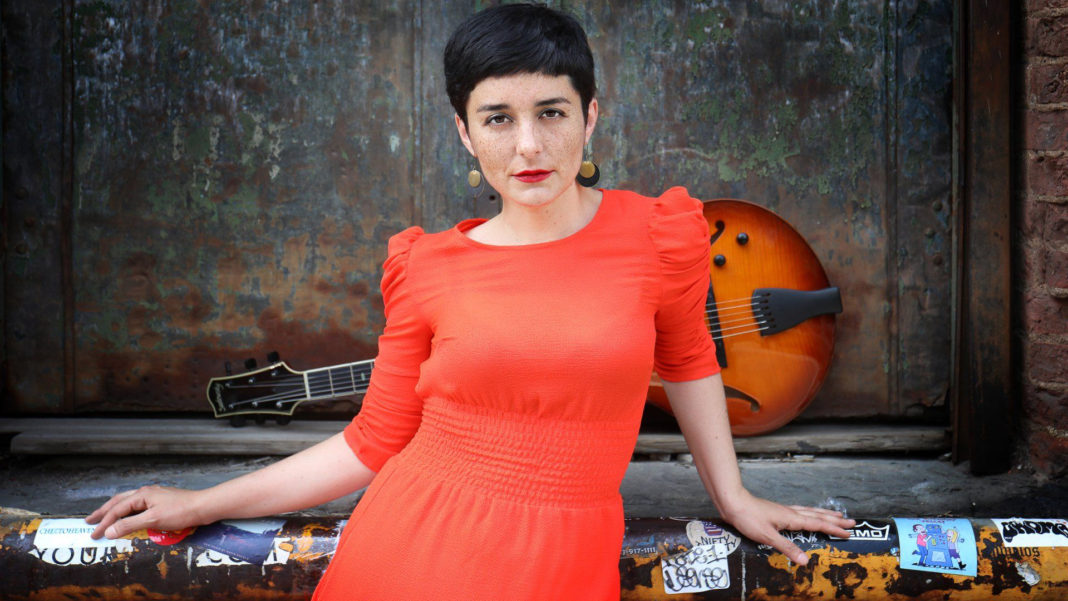One of the great things about living in a city like Los Angeles is that you get exposed to artists from all over the world. Some of them are better known and others are just on the precipice of becoming much bigger stars. That certainly applies to Chilean jazz singer/songwriter/guitarist Camila Meza. When she performs at The Soraya on Saturday night concertgoers won’t get just a chance to see and hear her, they will be on stage with her for an intimate concert celebrating her album Ámbar.

Meza has released five albums: Skylark, Retrato, Prisma, Traces and her most recent is Ámbar. Critics from the New York Times, Downbeat Magazine and others have praised Meza. She is an artist who carefully selects the songs she wants to cover and on this new album she has expanded more substantially into songwriting.
Last week I spoke by phone with Meza who was, at the time, in Chile. Though born there, she lives in New York City. During our conversation we discussed some of the themes that are circling in and around the songs on Ámbar. Here are excerpts from that conversation that have been edited for length and clarity.
The title track for your album was inspired by the death of your grandfather and your inability to get there for his funeral. How did writing that song allow you to have some healing?
This song dates back to my first year in New York. It’s one of those songs that I ended up realizing it’s worth kind of later on. When I was writing it, it was a little bit out of that grief. I remember crying while I was writing. But then after this process of creation, you end up with almost the opposite feeling. I ended up feeling I was connected with my lost one. I had done something to communicate with his spirit and eventually something beautiful had come out of that really difficult moment. I remember also that was my first realization of that power of music that has often been my guiding light in many scenarios in my life.
Do you find yourself celebrating him when you perform the song in concert?
I guess I go through the same experience. I also relive that pain and that feeling of missing someone, but after the song ends, I feel renewed. I think that’s the beauty of music – you are not trying to suppress any feelings.
You cover the David Bowie/Pat Metheny song This Is Not America on the album. Why that song and why now?
That was one of the last songs we arranged for the album. I had the experience of meeting Pat Metheny who has been an influence for my whole life. This song ended up coming serendipitously and it just clicked. I heard it and I was “This is the song that was missing.” We had to put this out because I felt the need to speak up.
We are experiencing the harm of a divisive and intolerant and non-uniting group of people in power. Injustices and how dangerous some policies your representatives are putting out there and they are affecting the whole spectrum of society. Every time something horrible happened, this song resonated.
You are big fan of Milton Nascimento and have included his Milagres dos Peixe on this album. His landmark 1973 album was censored in his native Brazil. Was the inclusion of this song part of a bigger comment you were making?
I would say so. Honestly it wasn’t premeditated. A few songs contain political messages and they all had a thread of this same idea of acknowledging something we are all experience as a society. When Milton is talking about how children no longer see the sun rising or how a flower grows, he’s also criticizing something that is global – the disconnection of humanity from nature and how detrimental that is for us as a whole. There is an intention on each of these songs to talk about things I care about and our experience as human beings today.
One of your major influences is Chilean singer/songwriter Victor Jara – an artist who was not just censored, but tortured and killed by Augusto Pinochet’s government. Does he inspire you not just as a musician but also to speak out?
Oh absolutely. Most Latin American musicians I admire, they all spoke out in their times. Someone like Milton or Mercedes Sosa, they were making a mark and they were always in touch with that message of liberation more than anything. As you know, Latin America is a place that has experienced a lot of oppression. Every country has its own story. Most musicians you listen to remember those stories.
Elvis Costello once said, “Can a mere song change a people’s minds? I doubt that it is so. But a song can infiltrate your heart and the heart may change your mind.” Do you agree and how important is infiltrating an audience’s hearts for you?
That’s such a beautiful quote. It’s an interesting question, too. There’s that balance between putting out a message that’s almost personal you know. It’s just speaking from your own heart something that is tickling to come out. With no other intention rather than just materializing and putting that emotion, that feeling, that vision out there; to be able to observe it yourself. But then when that is shared, when it is pure and honest, it will resonate the same way with other people. You will eventually be able to put that art, that message, into other people’s hearts and create and they will create their own landscape of emotions.
Photo of Camila Meza by Chris Drukker/Courtesy of Red Cat Publicity











